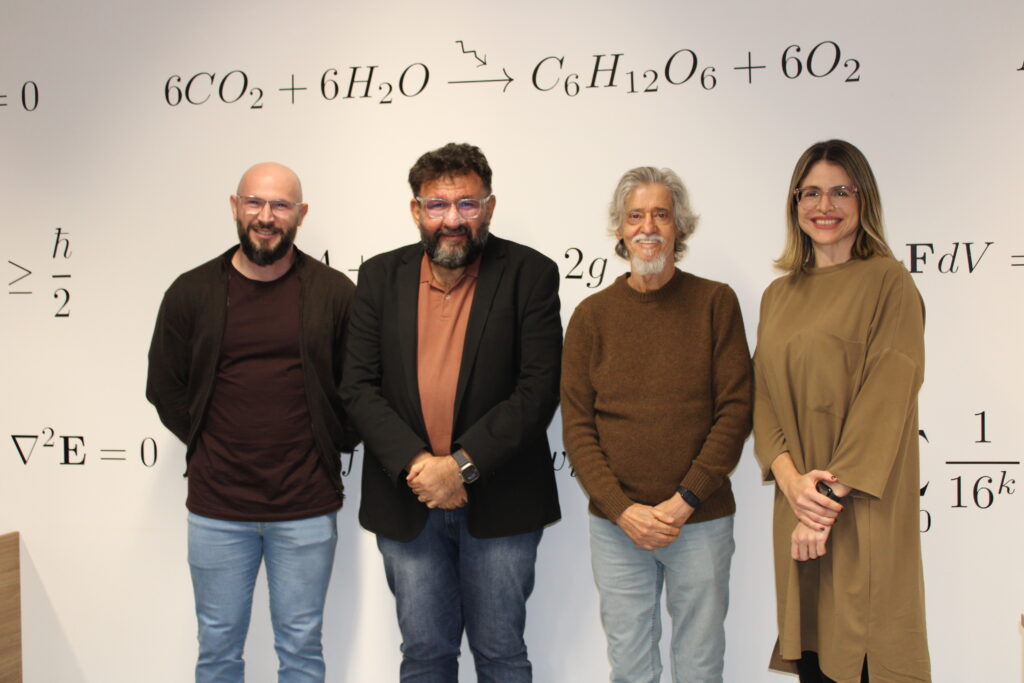Ilum’s pedagogical proposal, with its innovative teaching model, motivated the Secretary of Science, Technology, Innovation and Higher Education of the State of Paraíba, Claudio Furtado, to visit the Brazilian Center for Research in Energy and Materials (CNPEM) and its faculty on July 29th and 30th. The Secretary was accompanied by his Technical Management Advisor, Iolanda Corteza, and by the Professor of the State University of Paraíba, José Jamilton Rodrigues dos Santos.
The main objective of the visit was to get a firsthand look at Ilum’s teaching model and infrastructure up close, so that the state of Paraíba can also have a similar educational institution in future. “Our intention is that we can, within the characteristics of the place, repeat the idea in Paraíba. This visit is aimed at ‘drinking at the source’ and, in partnership with Ilum, implement a course in Science and other areas in the future. It is important to look at this aspect of problem-based learning,” said the Secretary.

Cláudio Furtado is a physicist by training. As a researcher, he worked in the areas of Condensed Matter Physics and Quantum Field Theory in Curved Spacetime (QFTCS[1] ). In October 2024, he was recognized as one of the most influential researchers in the world, according to the publisher Elsevier in partnership with Stanford University, in the USA. “What I liked most about Ilum is that students are already immersed in the day-to-day science. Students begin building a curriculum in which, from an early age, they work with scientific initiation, using equipment and techniques that help them better retain what they have learned theoretically,” said Furtado.
On the first day of the visit, the trio was welcomed by Ilum’s pedagogical coordinator, Nelson Studart, who gave a presentation of the School and a tour of the classrooms and laboratories. In the afternoon, Professor Ana Zeri accompanied them on a guided tour of Sirius, a particle accelerator that, like Ilum, is part of CNPEM. On the second day, the group was able to attend a visit by members of the Ministry of Education to Ilum and learn more details about the School’s pedagogical project.
About the Ilum School of Science
Ilum offers a free undergraduate degree program that utilizes an interdisciplinary approach to train scientists and professionals in science and technology. With an innovative educational model, the three-year full-time bachelor program offers courses that connect life sciences, materials science, data science, artificial intelligence, and the humanities in order to prepare researchers to work in an ethical and collaborative manner in the search for solutions to the global challenges of the twenty-first century. The Ilum School of Science is funded by the Brazilian Ministry of Education (MEC) and is part of the Brazilian Center for Research in Energy and Materials (CNPEM) in Campinas, São Paulo, a social organization overseen by the Ministry of Science, Technology, and Innovation (MCTI). Ilum’s educational mission offers early contact with experimental activities, in teaching labs at the school as well as at CNPEM, in projects carried out together with researchers.
About CNPEM
The Brazilian Center for Research in Energy and Materials (CNPEM) is home to a state-of-the-art, multi-user and multidisciplinary scientific environment and works on different fronts within the Brazilian National System for Science, Technology and Innovation. A social organization overseen by the Ministry of Science, Technology and Innovation (MCTI), CNPEM is driven by research that impacts the areas of health, energy, renewable materials, and sustainability. It is responsible for Sirius, the largest assembly of scientific equipment constructed in the country, and is currently constructing Project Orion, a laboratory complex for advanced pathogen research. Highly specialized science and engineering teams, sophisticated infrastructure open to the scientific community, strategic lines of investigation, innovative projects involving the productive sector, and training for researchers and students are the pillars of this institution that is unique in Brazil and able to serve as a bridge between knowledge and innovation. CNPEM’s research and development activities are carried out through its four National Laboratories: Synchrotron Light (LNLS), Biosciences (LNBio), Nanotechnology (LNNano), Biorenewables (LNBR), as well as its Technology Unit (DAT) and the Ilum School of Science — an undergraduate program in Science and Technology supported by the Ministry of Education (MEC).
https://cnpem.br/en/






